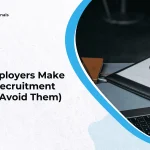Hire The Best: Essential Recruiting Metrics for Quality Candidate in Nigeria’s Job Market
Attracting and keeping top talent in Nigeria’s crowded job market has become a major challenge for recruiters. According to a report by the National Bureau of Statistics, Nigeria’s unemployment rate was a staggering 33.3% in Q4 2020, highlighting the urgent need for effective recruitment strategies.
“Nigeria’s job market is saturated with skilled candidates, yet organisations struggle to find the right fit,” says Oluwakemi Ogundeji, Managing Director of a leading recruitment firm in Lagos. A 2021 survey by the Chartered Institute of Personnel Management (CIPM) revealed that 72% of Nigerian businesses face difficulties attracting and retaining skilled workers.
To overcome these challenges, recruiters must use data-driven recruiting metrics to streamline processes and make informed decisions. By analysing key performance indicators (KPIs) like time-to-hire, cost-per-hire, and candidate sourcing channels, they can identify bottlenecks, optimise strategies, and improve their ability to secure top talent.
Sourcing Effectiveness
Do you know which hiring channels bring in the best candidates for your open roles? Tracking sourcing effectiveness lets you see which job boards, social sites, and referral programs yield the most qualified applicants. Utilise data tracking to optimise your recruitment marketing spend.
Candidate Quality
When evaluating candidates, quality is king. Look at metrics like retention rates, performance reviews, and cultural fit assessments for hires from each sourcing channel. Attracting high-caliber candidates improves organisational performance and reduces turnover costs.
Time-to-Hire
How long does it take to fill an open role from posting to hire? A protracted time-to-hire balloons recruitment costs, hurts productivity, and causes missed opportunities. Analyze your process to identify bottlenecks and streamline workflows through measures like shortening interviews or fine-tuning job descriptions.
Cost-Per-Hire
Hiring isn’t free – there are costs for job advertising, recruiter fees, agency fees, and more. Calculating your true cost-per-hire enables smarter budgeting decisions to maximize your recruitment ROI. Understand what you’re spending to acquire top talent.
Offer Acceptance Rate
Are candidates enthusiastically accepting your job offers? A low acceptance rate may signal issues with compensation, culture fit, or your recruiting process itself. Dig into the reasons behind declined offers to better align with candidate expectations.
Diversity Analytics
Do your recruitment and hiring practices promote equal opportunities and an inclusive, diverse workforce? Measure gender, ethnic, age, and background representation metrics. A diverse employee base unlocks innovation, engagement, and better performance.
Candidate Experience
The candidate’s journey from first applying to accepting an offer shapes their perception of your employer brand. Gather feedback, streamline applications, and provide transparency to deliver a phenomenal recruiting experience that attracts elite candidates and improves retention.
Offer Decline Rate
Even after extending an offer, some candidates will pass. A high offer decline rate indicates potential problems with the role, compensation, or your company’s reputation that must be addressed. Analyse declines to understand and resolve the root causes.
FAQs (Frequently Asked Questions)
How do you measure good candidates? Top recruiters look at if hired people stay long, what managers say about them, and if they fit the company well. Tracking these things shows if you hired talented people who are a good match.
Why is diversity important when hiring? Having diverse employees of different genders, races, ages, and backgrounds brings fresh ideas. A diverse workforce increases creativity, happiness at work, and business success. Measuring diversity ensures fair hiring for all.
How do you give candidates a good experience? Make applying easy, communicate clearly, and ask for feedback. Treating candidates well enhances your reputation for attracting top talent and keeping good employees.
Why do candidates turn down job offers? They may not like the pay, job duties, or company culture. Understanding why offers get declined helps you improve to meet candidate expectations.
Why does hiring time matter? Slow hiring leads to higher costs, lower productivity, and missed opportunities. Tracking hiring time identifies problems to speed up the process.
How do I find the best candidates? Use data to see which job boards, social media, or referrals bring in qualified applicants. Focus efforts on the sources bringing in the best candidates.


